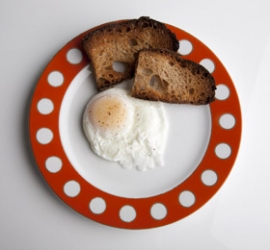Written by Alexandra Rothwell, MPH, RD, CSO, CDN
The bland diet is a loosely defined collection of diet restrictions that may be prescribed following gastrointestinal surgery or as management for gastric distress (e.g. nausea, vomiting, and/or diarrhea). When thinking about bland foods, I can’t stop myself from bringing up mental images of boiled chicken breast and olive-colored string beans on hospital trays - definitely bland but not an accurate depiction of what this diet can be at its best. So, perhaps it’s time to give the bland diet a makeover? Let’s keep those trays in the hospital and out of our heads…
The point of a bland diet is to decrease irritation to the gastrointestinal tract. A few foods and food categories are thought to exacerbate digestive issues. These include:
Insoluble Fiber:
Insoluble fiber is a category of fibers found naturally in foods that are not absorbed in our digestive tract. Most of us are encouraged to eat more insoluble fiber in order to keep bowel movements regular and moderate appetite. Additionally, foods that contain insoluble fiber are some of the healthiest around, including fruit and vegetables, beans, whole grains, nuts, and seeds. Thankfully, with some modification, variations of most of these foods are acceptable on a bland diet. Cooked fruits and vegetables, small amounts of nut butters (e.g. almond butter, peanut butter, etc.), and well cooked or refined grains (e.g. oats, white rice, farina, crackers, etc.) are a few examples. Avoid beans, cruciferous vegetables (i.e. broccoli, cabbage, etc.), raw fruit and vegetables, dried fruit, and high fiber grain products, such as whole wheat breads and high-fiber cereals.
Alcohol:
Whether it’s wine, beer or hard alcohol, none of these are appropriate for someone on a bland diet, as they can irritate the intestines and/or cause acid reflux. Drink hydrating beverages such as water, which can be made a bit more festive with mint sprigs or slices of cucumber, apples, and other fresh fruit.
Caffeine:
Caffeine is a gastric stimulant, so while on a bland diet, avoid coffee (including decaf - see “acid”), caffeine-containing teas, energy drinks, and dark chocolate. Herbal teas, such as chamomile and rooibos are great alternatives.
Acid:
Eating foods with a high acid content can exacerbate digestive issues. Limit citrus, vinegars, chocolate, tomatoes, coffee, carbonated beverages, and other high acid foods. **Depending on how seriously you need to follow the bland diet, i.e. how severe your digestive issues are, you can incorporate some acids in cooking to improve flavors.
Fat:
Foods that are very high in fat - particularly those that are oily, greasy, or deep-fried - require an increase in digestive acids for their breakdown and absorption, and this can be irritating to the gastrointestinal tract. Additionally, excess fat can stimulate intestinal contractions and worsen digestive issues. Interestingly, a type of fat called medium-chain triglycerides (MCT), which are found naturally in coconut oil, are easier to digest than other fats. Pure coconut milk makes a great base for smoothies, can be whipped into a creamy dessert, or can be used in cooking as a substitute for dairy milk.
Milk and Milk Products:
As we enter adulthood, some people lose the ability to fully digest the sugar in milk - lactose. This can cause, bloating, gas, and general abdominal discomfort after eating lactose-rich foods like milk and ice cream. Other people may develop a temporary intolerance to lactose following intestinal surgery or extended periods of diarrhea. Given this information, when prescribed a bland diet, it’s smart to air on the side of caution and avoid incorporating much lactose, at least initially. Low-fat yogurt and low-fat cheese are some of the better-tolerated milk products, due to their lower lactose content. Gradually experiment with other low-fat milk products, incorporating small amounts of dairy to measure your tolerance. Coconut and soy milk can be great substitutes for cow’s milk.
Sugars and Sugar Alcohols:
Similar to lactose, some sugars and sugar alcohols can be difficult to absorb, which can cause or exacerbate intestinal issues. Stay away from prune and apple juice, which contain high quantities of fructose. Be moderate when incorporating high sources of sugar such as dried and whole fruit into the bland diet. Read ingredient lists carefully, and avoid sugar alcohols, such as xylitol and sorbitol, which are often found in low-sugar or “diet” products.
Spices:
Any hot or spicy foods can be particularly irritating to the intestinal tract. Stay away from hot peppers, raw garlic, mustard and other intense flavors. Instead, use soothing spices, such as rosemary, oregano, thyme, ginger, and cinnamon.
Despite this long list of “no-nos”, I hope that I have also highlighted a few of the best foods to eat while on a bland diet. Instead of focusing on your restrictions, think of this time as a phase of healing and easing your gut into your regular, healthy style of eating. Experiment with new soothing recipes. Try cooking rice with some of the water replaced by coconut milk. Roast peaches, and serve them with cinnamon and a dollop of low-fat Greek yogurt. Cook fish “en papillote” with rosemary, thyme, potatoes and carrots. Make savory oatmeal, topped with a poached egg. Most importantly, be intuitive about which foods may be particularly irritating to you, and nourish yourself in the way that you would care for someone you love.
